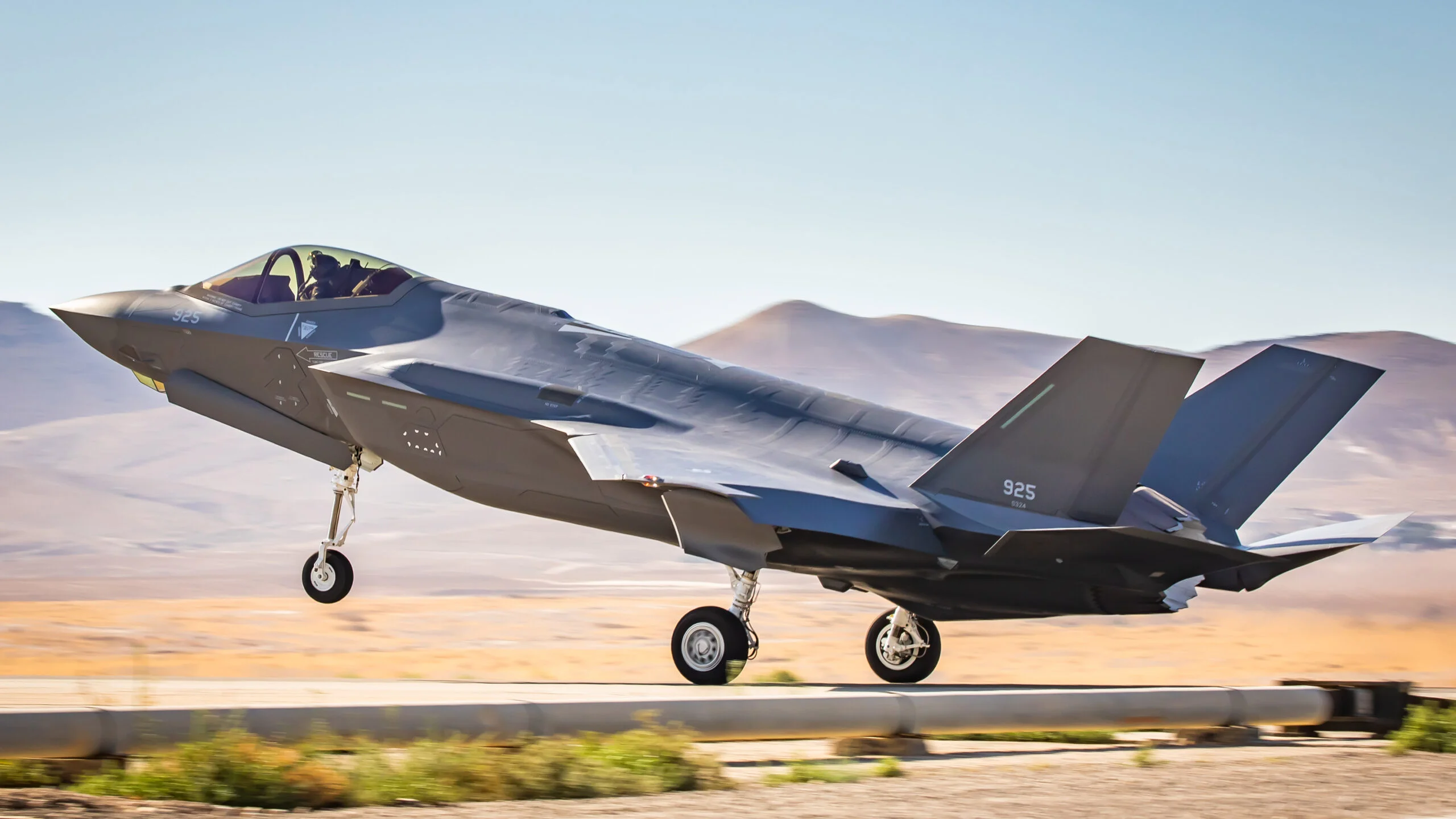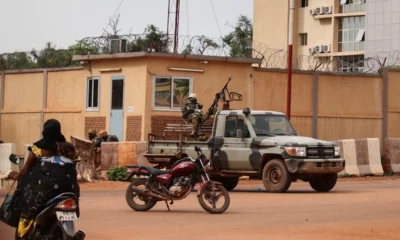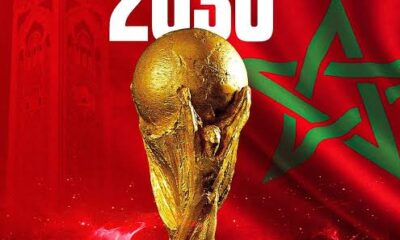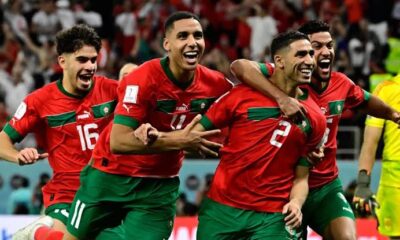Strictly Personal
Morocco should use ever-growing ties with Israel to procure F-35 fighter jets, By Samir Bennis
Published
1 year agoon

As the winds of Western Sahara diplomacy continue to blow in Morocco’s direction, this week has been marked by another crucial development for the seemingly, increasingly irreversible Moroccan momentum on this lingering territorial dispute.
Indeed, whatever one may think of Israel as a country, and regardless of the expected torrent of dismissive statements from Algeria, a dispassionate reading of MENA geopolitics suggests that the Israeli recognition of Morocco’s sovereignty over its Western Sahara adds more strategic depth to Morocco’s ongoing annihilation of Algeria’s unrelenting lobbying for the creation of an independent state in southern Morocco.
Having said that, Morocco’s next strategic move should be to explore the possibility of buying the US-made F-35 fighters. Obtaining these fighters would permanently alter the military balance of power in the Maghreb in Morocco’s favor.
Despite the heavy investments Morocco has made in recent years to upgrade and reinforce its military, it still lags behind Algeria in terms of air power. Algeria’s petrodollars have enabled it to build a military edge over Morocco in this area.
In keeping with its determination to maintain its qualitative air superiority over Morocco, Algeria has engaged in negotiations with Russia with the view to buy the Su-75 Checkmate fighter jet. Manufactured by Russia’s Sukhoi, the Su-57 is equipped with stealth technology and is meant to rival the US-made F-35. Should Russia and Algeria’s negotiations come to fruition, the Algerian regime could obtain the fighter jet by 2029.
But this military edge that Algeria seeks to reinforce, could be shattered permanently in the event that Morocco succeeds in convincing the US to allow it to enter the select club of countries who are permitted to buy this state-of-the-art F-35 fighter jet.
It is an open secret that one of the basic tenets of US foreign policy in the Middle East is to allow Israel to maintain its qualitative military edge and superiority over its neighbors. All US administrations over the past decades have abided by this policy and abstained from striking any military deal that could erode Israel’s military edge over its neighbors.
This explains why, as of today, Israel is the only country in the Middle East to have the sought-after F-35 jets in its arsenal. Sure enough, the US did sign in January 2021 a deal with the UAE that would have made the Gulf nation the first MENA country to obtain this fifth-generation fighter. Yet the deal has been at a standstill because of a number of conditions that the Biden administration imposed on the UAE government.
Washington’s growing concern about Abu Dhabi’s evolving economic ties with China is the primary reason why negotiations between Abu Dhabi and Washington over the finalization of the sale and delivery of the F-35 have stalled. In other words, the US is also unhappy with the UAE’s strengthening of its trade and technology relations with China.
Additionally, the US is displeased with the contracts that some Emirati companies signed with the Chinese company Huawei to provide them with 5G technology. US officials fear that the deployment of the Huawei cell towers close to F-35 bases would enable China to steal information about the F-35 technology.
The diplomatic significance of Israel
Israel’s mediation was instrumental and indispensable for the UAE to engage in negotiations with the Trump administrations in relation to acquiring the F-35. Morocco could take this same approach, and use its ever-growing ties with Israel as a stepping-stone to procure the sought-after F-35.
With Morocco’s growing security and military ties with the US — which reached a new milestone with the signing of a 10-year military agreement in 2020 — and its status as a major non-NATO ally, the course is clear for the North African kingdom to procure the F-35 fighter jets.
Make no mistake, as long as Algeria is governed by a military junta that is bent on destabilizing and destroying Morocco, there can be no normalization of relations between Algiers and Rabat. As long-time, keen observers of North African geopolitics will recall, Morocco has over the past few years made several attempts to extend an olive branch to Algeria, urging its leaders to usher the region in a new era of cooperation and a win-win partnership.
Morocco’s efforts have proved pointless in the face of Algeria’s deep-rooted obsession with undermining Moroccan territorial integrity in order to emerge as the Maghreb’s foremost and undisputed regional hegemon.
And so, given Algeria’s long history of hostility towards Moroccan institutions, history, and cultural heritage, it is ultimately unwise to expect any Algerian-Moroccan reconciliation in the near future. Instead, Morocco’s attempts to find common ground seem to have exacerbated Algeria’s determination to antagonize Morocco. Guided by the same myopic and anachronistic worldview in which it sees itself as the hegemon of the Maghreb, Algeria views Morocco as the only major obstacle that stands in the way to realizing its goal of regional primacy.
Morocco – Algeria’s ‘useful’ scapegoat
With Algeria’s military persistence to use Morocco as a scapegoat and the culprit of setbacks it has suffered in recent years on the diplomatic, political, economic, and sporting fronts, chances of its leaders engaging in a military confrontation with Morocco remain high.
The conventional wisdom remains that despite their decades-long arms race, Algeria and Morocco are unlikely to engage in a direct confrontation given the devastating consequences such a war could have for both countries in particular, and for regional stability and security in general.
Still, it would be foolish to completely rule out the possibility, however remote or tiny, of a full-scale military showdown between Algiers and Rabat.
Indeed, in today’s context an unprecedented torrent of hostility and Morocco-bashing coming from Algeria’s media and politico-military establishment, a hypothetical resumption of the Hirak movement in the country could push the top-brass military to go for a military confrontation as a way of deviating the attention of the Algeria people from their country’s economic and social woes.
Given the volatility and unreliability of Algeria’s military leaders, the only way forward for Morocco to prevail in this decades-long regional rivalry and to avoid this scenario is to have the military might that would deter Algeria from taking any actions that might endanger peace and stability in the Maghreb region.
In this tense and potentially explosive context, Morocco’s securing the F-35 and the subsequent, accompanying military and political backing from both the US and Israel appears to be the surest and best means of deterrence against Algeria.
Even in the event Algeria was to procure a Russian fifth-generation fighter jet, it would fall short of matching the qualitative air superiority that Morocco would be provided thanks to the cutting-edge technology of the F-35, which is far superior to that of the Chinese or the Russians.
The ongoing war in Ukraine has provided ample evidence that Russia’s military technology lags far behind its US counterpart. Experts blame Russia’s failure to achieve air superiority over Ukraine to flaws found in the Su-57, the first version of its stealth technology. And to date, there are no guarantees that the second version of Sukhoi’s stealth technology will not have similar flaws as those found in the first version.
Israel’s recognition of Morocco’s sovereignty over the Sahara has reinforced the ever-growing and irreversible global consensus that a political solution within the framework of Morocco’s sovereignty is the only way of bringing the dispute to a close and preserving regional peace and stability.
If the Moroccan government takes the necessary actions of further upgrading the country’s military’s firepower and operational capability in the coming months and years, not only will Morocco effectively preempt an Algeria-induced military confrontation in the region, but it would also — and perhaps more fundamentally so — be preserving the strategic and diplomatic breakthroughs it has achieved of late on the Western Sahara question.
Samir Bennis is the co-founder of Morocco World News. You can follow him on Twitter @SamirBennis.
You may like
-


Moroccan annual inflation rises to 0.8% in November
-


FIFA Ranking: Nigeria ends 2024 as fifth best team in Africa
-


Burkina Faso releases 4 French spies after Moroccan intervention
-


FIFA officially confirms Morocco 2030 World Cup co-host
-


FIFA Ranking: Morocco remains Africa’s best as Nigeria suffers big drop
-


Wafcon 2024 draw throws up interesting pairings
Strictly Personal
Let’s merge EAC and Igad, By Nuur Mohamud Sheekh
Published
4 weeks agoon
November 27, 2024
In an era of political and economic uncertainty, global crises and diminishing donor contributions, Africa’s regional economic communities (RECs) must reimagine their approach to regional integration.
The East African Community (EAC) and the Intergovernmental Authority on Development (Igad), two critical RECs in East Africa and the Horn of Africa have an unprecedented opportunity to join forces, leveraging their respective strengths to drive sustainable peace and development and advance regional economic integration and promote the African Continental Free Trade Area (AfCFTA).
Already, four of the eight Igad member states are also members of the EAC and, with Ethiopia and Sudan showing interest, the new unified bloc would be formidable.
Igad’s strength lies in regional peacemaking, preventive diplomacy, security, and resilience, especially in a region plagued by protracted conflicts, climate challenges, and humanitarian crises. The EAC, on the other hand, has made remarkable strides in economic integration, exemplified by its Customs Union, Common Market, and ongoing efforts toward a monetary union. Combining these comparative advantages would create a formidable entity capable of addressing complex challenges holistically.
Imagine a REC that pairs Igad’s conflict resolution strengths with the EAC’s diplomatic standing and robust economic framework. Member states of both are also contributing troops to peacekeeping missions. Such a fusion would streamline efforts to create a peaceful and economically prosperous region, addressing the root causes of instability while simultaneously promoting trade investment and regional cooperation.
These strengths will be harnessed to deal with inter-state tensions that we are currently witnessing, including between Ethiopia and Somalia over the Somaliland MoU, strained relations between Djibouti and Eritrea, and the continually deteriorating relations between Eritrea and Ethiopia.
The global economy experienced as a result of the COVID-19 pandemic, compounded by the Ukraine war and competing global crises, has strained donor countries and reduced financial contributions to multilateral organisations and African RECs. Member states, many of which are grappling with fiscal constraints, are increasingly unable to fill this gap, failing to make timely contributions, which is in turn affecting key mandate areas of Igad and EAC, and staff morale.
A merger between Igad and EAC would alleviate this financial pressure by eliminating redundancies. Shared administrative systems, integrated programmes, and a unified leadership structure would optimise resources, enabling the new REC to achieve more with less. Staff rationalisation, while sensitive, is a necessary step to ensure that limited funds are channelled toward impactful initiatives rather than duplicative overheads.
The African Union (AU) envisions a fully integrated Africa, with RECs serving as the building blocks of the AfCFTA. A unified EAC-Igad entity would become a powerhouse for regional integration, unlocking economies of scale and harmonising policies across a wider geographical and economic landscape.
This merger would enhance the implementation of the AfCFTA by creating a larger, more cohesive market that attracts investment, fosters innovation, and increases competitiveness. By aligning trade policies, infrastructure projects, and regulatory frameworks, the new REC could serve as a model for others, accelerating continental integration.
The road to integration is not without obstacles. Political will, divergent institutional mandates, and the complexity of harmonising systems pose significant challenges. However, these hurdles are surmountable through inclusive dialogue, strong leadership, and a phased approach to integration.
Member states must prioritise the long-term benefits of unity over short-term political considerations. Civil society, the private sector, the youth, and international partners also have a critical role to play in advocating for and supporting this transformative initiative.
The time for EAC and Igad to join forces is now. By merging into a single REC, they would pool their strengths, optimise resources, and position themselves as a driving force for regional and continental integration. In doing so, they would not only secure a prosperous future for their citizens and member states but also advance the broader vision of an integrated and thriving Africa.
As the world grapples with crises, Africa must look inward, embracing the power of unity to achieve its potential. A combined Igad-EAC is the bold step forward that the continent needs.
Nuur Mohamud Sheekh, a diplomatic and geopolitical analyst based in London, is a former spokesperson of the Igad Executive Secretary. X: @NuursViews
Strictly Personal
Budgets, budgeting and budget financing, By Sheriffdeen A. Tella, Ph.D.
Published
1 month agoon
November 20, 2024
The budget season is here again. It is an institutional and desirable annual ritual. Revenue collection and spending at the federal, State and local government levels must be authorised and guided by law. That is what budget is all about. A document containing the estimates of projected revenues from identified sources and the proposed expenditure for different sectors in the appropriate level of government. The last two weeks have seen the delivery of budget drafts to various Houses of Assembly and the promise that the federal government would present its draft budget to the National Assembly.
Do people still look forward to the budget presentation and the contents therein? I am not sure. Citizens have realised that these days, governments often spend money without reference to the approved budget. A governor can just wake up and direct that a police station be built in a location. With no allocation in the budget, the station will be completed in three months. The President can direct from his bathroom that 72 trailers of maize be distributed to the 36 states as palliatives. No budget provision, and no discussion by relevant committee or group.
We still operate with the military mentality. We operated too long under the military and of the five Presidents we have in this democracy, two of them were retired military Heads of State. Between them, they spent 16 years of 25 years of democratic governance. Hopefully, we are done with them physically but not mentally. Most present governors grew up largely under military regimes with the command system. That is why some see themselves as emperor and act accordingly. Their direct staff and commissioners are “Yes” men and women. There is need for disorientation.
The importance of budget in the art of governance cannot be overemphasized. It is one of the major functions of the legislature because without the consideration and authorisation of spending of funds by this arm of government, the executive has no power to start spending money. There is what we refer to as a budget cycle or stages. The budget drafting stage within the purview of the executive arm is the first stage and, followed by the authorisation stage where the legislature discusses, evaluates and tinkers with the draft for approval before presenting it to the President for his signature.
Thereafter, the budget enters the execution phase or cycle where programmes and projects are executed by the executive arm with the legislature carrying out oversight functions. Finally, we enter the auditing phase when the federal and State Auditors verify and report on the execution of the budgets. The report would normally be submitted to the Legislature. Many Auditor Generals have fallen victim at this stage for daring to query the executives on some aspects of the execution in their reports.
A new budget should contain the objectives and achievements of the preceding budget in the introduction as the foundation for the budget. More appropriately, a current budget derives its strength from a medium-term framework which also derives its strength from a national Development Plan or a State Plan. An approved National Plan does not exist currently, although the Plan launched by the Muhammadu Buhari administration is in the cooler. President Tinubu, who is acclaimed to be the architect of the Lagos State long-term Plan seems curiously, disillusioned with a national Plan.
Some States like Oyo and Kaduna, have long-term Plans that serve as the source of their annual budgets. Economists and policymakers see development plans as instruments of salvation for developing countries. Mike Obadan, the former Director General of the moribund Nigeria Centre for Economic and Management Administration, opined that a Plan in a developing country serves as an instrument to eradicate poverty, achieve high rates of economic growth and promote economic and social development.
The Nigerian development plans were on course until the adoption of the World Bank/IMF-inspired Structural Adjustment Programme in 1986 when the country and others that adopted the programme were forced to abandon such plan for short-term stabilisation policies in the name of a rolling plan. We have been rolling in the mud since that time. One is not surprised that the Tinubu administration is not looking at the Buhari Development Plan since the government is World Bank/IMF compliant. It was in the news last week that our President is an American asset and by extension, Nigeria’s policies must be defined by America which controls the Bretton Woods institutions.
A national Plan allows the citizens to monitor quantitatively, the projects and programmes being executed or to be executed by the government through the budgeting procedure. It is part of the definitive measures of transparency and accountability which most Nigerian governments do not cherish. So, you cannot pin your government down to anything.
Budgets these days hardly contain budget performance in terms of revenue, expenditure and other achievements like several schools, hospitals, small-scale enterprises, etc, that the government got involved in successfully and partially. These are the foundation for a new budget like items brought forward in accounting documents. The new budget should state the new reforms or transformations that would be taking place. Reforms like shifting from dominance of recurrent expenditure to capital expenditure; moving from the provision of basic needs programmes to industrialisation, and from reliance on foreign loans to dependence on domestic fund mobilisation for executing the budget.
That brings us to the issue of budget deficit and borrowing. When an economy is in recession, expansionary fiscal policy is recommended. That is, the government will need to spend more than it receives to pump prime the economy. If this is taken, Nigeria has always had a deficit budget, implying that we are always in economic recession. The fact is that even when we had a surplus in our balance of payment that made it possible to pay off our debts, we still had a deficit budget. We are so used to borrowing at the national level that stopping it will look like the collapse of the Nigerian state. The States have also followed the trend. Ordinarily, since States are largely dependent on the federal government for funds, they should promote balanced budget.
The States are like a schoolboy who depends on his parents for school fees and feeding allowance but goes about borrowing from classmates. Definitely, it is the parents that will surely pay the debt. The debt forgiveness mentality plays a major role in the process. Having enjoyed debt forgiveness in the past, the federal government is always in the credit market and does not caution the State governments in participating in the market. Our Presidents don’t feel ashamed when they are begging for debt forgiveness in international forum where issues on global development are being discussed. Not less than twice I have watched the countenance of some Presidents, even from Africa, while they looked at our president with disdain when issues of debt forgiveness for African countries was raised.
In most cases, the government, both at the federal and state cannot show the product of loans, except those lent by institutions like the World Bank or African Development Bank for specific projects which are monitored by the lending institutions. In other cases, the loans are stolen and transferred abroad while we are paying the loans. In some other cases, the loans are diverted to projects other than what the proposal stated. There was a case of loans obtained based on establishing an international car park in the border of the State but diverted to finance the election of a politician in the State. The politician eventually lost the election but the citizens of the State have to be taxed to pay the loan. Somebody as “Nigeria we hail thee”.
Transformation in budgeting should commence subsequently at the State and federal level. Now that local government will enjoy some financial autonomy and therefore budgeting process, they should be legally barred from contracting foreign loans. They have no business participating in the market. They should promote balanced budget where proposed expenditures must equal the expected revenues from federal and internal sources. The State government that cannot mobilise, from records, up to 40 percent of its total budget from IGR should not be supported to contract foreign loans. The States should engage in a balanced budget. The federal government budget should shift away from huge allocations to recurrent expenditure towards capital expenditure for capital formation and within the context of a welfarist state.
Sheriffdeen A. Tella, Ph.D.
EDITOR’S PICK


Coach of Mamelodi Sundowns female team suspended over sexual harassment allegations
The head coach of Mamelodi Sundowns women’s team, Jerry Tshabalala, has been suspended indefinitely amid allegations of sexual harassment of...


Ghana’s Afua Asantewaa begins second GWR sing-a-thon attempt
Ghanaian singer, Afua Asantewaa, on Saturday, began her second attempt at breaking the Guinness World Record (GWR) for the longest...


20 African tech-preneurs embark on Korean innovation tour
The African Development Bank Group’s Innovation and Entrepreneurship Lab has selected 20 promising tech entrepreneurs from various African technology ventures...


Zambia: Expert warns of food security threat due to climate change
A prominent Zambian climate-smart agriculture expert, Oliver Bulaya, has warned of a collapse of the county’s agricultural sector with a...


Outrage over murder of Nigerian beaten to death by South Africans inside estate security office
The Nigerian community, under the auspices of Nigerian Citizens Association in South Africa (NICASA), has raised the alarm over the...


Moroccan annual inflation rises to 0.8% in November
Morocco’s statistics office has confirmed that the country’s annual inflation rate, as determined by the consumer price index, increased from...


Swiss company Mercuria partners Zambia’s IDC in new metals trading firm
According to a statement released by Swiss commodities trader, Mercuria, on Thursday, it has established a metals trading arm with...


Nigerian activist remanded in prison for threatening President’s son
A Nigerian court has ordered a female activist, Olamide Thomas, to be remanded in prison custody for allegedly issuing a...


Zambian law association kicks over suspension of two members
The Law Association of Zambia (LAZ) has kicked against the suspension of two of its council members, Arnold Kaluba, the...


FIFA Ranking: Nigeria ends 2024 as fifth best team in Africa
Nigeria’s men’s football national team, the Super Eagles, ended the year 2024 as the fifth best team in Africa in...
Trending
-

 VenturesNow1 day ago
VenturesNow1 day agoMoroccan annual inflation rises to 0.8% in November
-

 Musings From Abroad1 day ago
Musings From Abroad1 day agoSwiss company Mercuria partners Zambia’s IDC in new metals trading firm
-

 Metro1 day ago
Metro1 day agoNigerian activist remanded in prison for threatening President’s son
-

 Metro8 hours ago
Metro8 hours agoOutrage over murder of Nigerian beaten to death by South Africans inside estate security office


